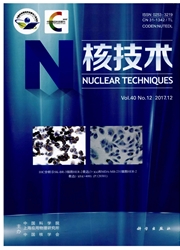

 中文摘要:
中文摘要:
放射性核素大气扩散模型中,基于示踪实验获得的经验扩散参数依赖于具体的实验条件,在事故条件下,由于风场、大气湍流、地表状态等与实验条件存在差异,经验扩散参数难以准确反映实际扩散过程。为了弥补这一不足,可以以经验参数为先验值,使用实际观测数据对其进行实时动态修正。本文基于遗传算法,建立动态修正模型,通过数值模拟得到4种适应度函数对修正结果的影响。结果表明,根据观测误差设置不同权重的适应度函数修正效果更好。在此基础上,使用Kincaid实验数据集进行模型预测能力的验证,结果表明,使用遗传算法对拉格朗日扩散模型中的扩散参数进行修正,可明显提高扩散模型的预测能力。
 英文摘要:
英文摘要:
Background: In radioactive nuclides atmospheric diffusion models, the empirical dispersion coefficients were deduced under certain experiment conditions, whose difference with nuclear accident conditions is a source of deviation. A better estimation of the radioactive nuclide's actual dispersion process could be done by correcting dispersion coefficients with observation data, and Genetic Algorithm (GA) is an appropriate method for this correction procedure. Purpose: This study is to analyze the fitness functions' influence on the correction procedure and the forecast ability of diffusion model. Methods: GA, coupled with Lagrange dispersion model, was used in a numerical simulation to compare 4 fitness fimctions' impact on the correction result. Results: In the numerical simulation, the fitness function with observation deviation taken into consideration stands out when significant deviation exists in the observed data. After performing the correction procedure on the Kincaid experiment data, a significant boost was observed in the diffusion model's forecast ability. Conclusion: As the result shows, in order to improve dispersion models' forecast ability using GA, observation data should be given different weight in the fitness function corresponding to their error.
 同期刊论文项目
同期刊论文项目
 同项目期刊论文
同项目期刊论文
 期刊信息
期刊信息
